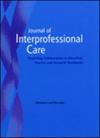Large-scale, mobile and technology-enhanced serious game for interprofessional education: pilot study and lessons learnt.
IF 1.9
3区 医学
Q3 HEALTH CARE SCIENCES & SERVICES
引用次数: 0
Abstract
Recent research suggests that serious gaming is a promising strategy for interprofessional education (IPE). This report describes the design and pilot testing of a large-scale, mobile, technology-enhanced serious game embedded in the IPE curriculum in Geneva, Switzerland. Organized into teams of eight, the students were tasked with finding a young patient who had just escaped from the intensive care unit. Through a series of 10 stations, they explored hospital- and community-based locations of the healthcare system and were engaged in various learning and game activities; they were rewarded with cues to unveil the mystery. A total of 582 undergraduate students from seven disciplines (medicine, midwifery, nursing, nutrition-dietetics, pharmacy, physiotherapy, and technology in medical radiology) took part. Survey results (response rate: 62.8%) suggest that an overall majority of students valued the game, particularly the collaborative experience of actively learning from others in autonomous teams. Qualitative feedback allowed us to identify future areas for improvement: simplifying the adventure storyline and optimizing student flow. Educational institutions across the world facing challenges when creating IPE activities will find in this report ideas and lessons learnt to use mobile technology and serious gaming for large cohorts of students.用于跨专业教育的大型移动和技术强化严肃游戏:试点研究和经验教训。
最近的研究表明,严肃游戏是跨专业教育(IPE)的一种有前途的策略。本报告介绍了在瑞士日内瓦的跨专业教育课程中嵌入大规模移动技术增强型严肃游戏的设计和试点测试情况。学生们分成八人小组,任务是寻找一名刚从重症监护室逃出来的年轻病人。通过一系列 10 个站点,他们探索了医疗保健系统中的医院和社区地点,并参与了各种学习和游戏活动;他们获得了揭开谜底的提示奖励。共有来自七个学科(医学、助产学、护理学、营养与饮食学、药学、物理治疗学和医学放射学技术)的 582 名本科生参加了此次活动。调查结果显示(回复率:62.8%),大多数学生都很喜欢这个游戏,尤其是在自主团队中积极向他人学习的协作体验。通过定性反馈,我们确定了今后需要改进的地方:简化冒险故事情节和优化学生流程。世界各地的教育机构在开展 IPE 活动时都面临着挑战,我们将在本报告中找到为大批学生使用移动技术和严肃游戏的想法和经验教训。
本文章由计算机程序翻译,如有差异,请以英文原文为准。
求助全文
约1分钟内获得全文
求助全文
来源期刊

Journal of Interprofessional Care
HEALTH CARE SCIENCES & SERVICES-
CiteScore
5.80
自引率
14.80%
发文量
124
审稿时长
6-12 weeks
期刊介绍:
The Journal of Interprofessional Care disseminates research and new developments in the field of interprofessional education and practice. We welcome contributions containing an explicit interprofessional focus, and involving a range of settings, professions, and fields. Areas of practice covered include primary, community and hospital care, health education and public health, and beyond health and social care into fields such as criminal justice and primary/elementary education. Papers introducing additional interprofessional views, for example, from a community development or environmental design perspective, are welcome. The Journal is disseminated internationally and encourages submissions from around the world.
 求助内容:
求助内容: 应助结果提醒方式:
应助结果提醒方式:


